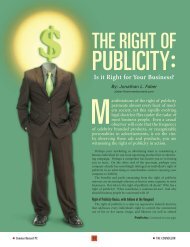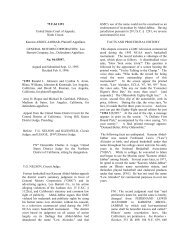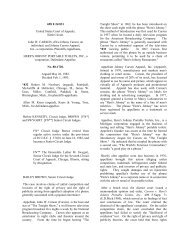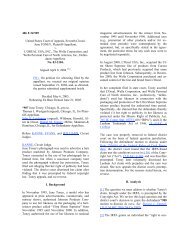Rufo v. OJ Simpson - Right Of Publicity
Rufo v. OJ Simpson - Right Of Publicity
Rufo v. OJ Simpson - Right Of Publicity
Create successful ePaper yourself
Turn your PDF publications into a flip-book with our unique Google optimized e-Paper software.
Page 19<br />
evidence about any score on such a test, nor any evidence of what any<br />
score means. You must totally disregard the questions about taking liedetector<br />
tests, test scores and their meanings, and treat the subject<br />
as though you had never heard of it. Do all of the jurors understand<br />
these instructions [The jurors nodded affirmatively, and when asked if<br />
any had questions, nodded negatively.]"<br />
Discussion<br />
In the absence of a stipulation between the parties, the results of<br />
a<br />
polygraph examination, as well as the fact of an offer to take, a<br />
refusal to<br />
[*603] take, or the taking of a polygraph examination, are<br />
inadmissible as<br />
evidence in California criminal and civil proceedings. (Evid. Code, @<br />
351.1;<br />
People v. Morris (1991) 53 Cal. 3d 152, 193, 279 Cal. Rptr. 720, 807<br />
P.2d 949;<br />
Arden v. State Bar (1987) 43 Cal. 3d 713, 723, 239 Cal. Rptr. 68, 739<br />
P.2d 1236;<br />
People v. Thornton (1974) 11 Cal. 3d 738, 763-764, 114 Cal. Rptr. 467,<br />
523 P.2d<br />
267.) But the present case is not one in which the results [**52] of a<br />
polygraph test were admitted into evidence. There were only statements<br />
by<br />
counsel, which the trial court appropriately instructed the jury are<br />
not<br />
evidence. The trial court's instructions prevented any prejudice to<br />
<strong>Simpson</strong> from<br />
insinuations in counsel's questions. ( People v. Parrella (1958) 158<br />
Cal. App.<br />
2d 140, 147, 322 P.2d 83; see People v. Morris, supra, 53 Cal. 3d at p.<br />
194;<br />
People v. Paul (1978) 78 Cal. App. 3d 32, 40, 144 Cal. Rptr. 431;<br />
People v.<br />
Babcock (1963) 223 Cal. App. 2d 813, 817-818, 36 Cal. Rptr. 178.)<br />
This case is strikingly similar to People v. Parrella, supra, 158<br />
Cal. App.<br />
2d 140. There the defendant on direct examination by his own attorney<br />
stated<br />
that while in custody he volunteered to take, and did take, a lie<br />
detector test.<br />
The prosecutor did not object to this testimony on the ground the<br />
defendant's<br />
willingness to take a lie detector test was inadmissible; rather,<br />
contending<br />
that defendant had opened the door, the prosecutor asked the defendant<br />
on<br />
cross-examination for the results of the test. Defense counsel objected<br />
that<br />
this question was improper because the results [**53] of a lie<br />
detector test<br />
are not admissible evidence. The trial court ruled that the<br />
prosecutor's







